小学一年级英语 Henrik Ibsen
(完整版)上海牛津版小学一年级英语单词表
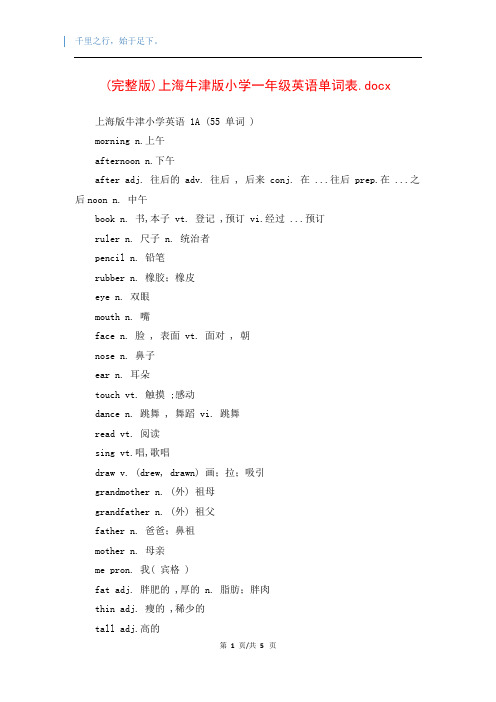
(完整版)上海牛津版小学一年级英语单词表.docx上海版牛津小学英语 1A (55 单词 )morning n.上午afternoon n.下午after adj. 往后的 adv. 往后 , 后来 conj. 在 ...往后 prep.在 ...之后noon n. 中午book n. 书,本子 vt. 登记 ,预订 vi.经过 ...预订ruler n. 尺子 n. 统治者pencil n. 铅笔rubber n. 橡胶;橡皮eye n. 双眼mouth n. 嘴face n. 脸 , 表面 vt. 面对 , 朝nose n. 鼻子ear n. 耳朵touch vt. 触摸 ;感动dance n. 跳舞 , 舞蹈 vi. 跳舞read vt. 阅读sing vt.唱,歌唱draw v. (drew, drawn) 画;拉;吸引grandmother n. (外) 祖母grandfather n. (外) 祖父father n. 爸爸;鼻祖mother n. 母亲me pron. 我( 宾格 )fat adj. 胖肥的 ,厚的 n. 脂肪;胖肉thin adj. 瘦的 ,稀少的tall adj.高的short adj. 短的 ,矮的 ,短暂的 n. 短裤 adv. 短暂地 ;忽然地 one num. 一two num. 二three num.三four num.四five num.五six num. 六apple n. 苹果pear n. 梨( 树)peach n. 桃子 , 桃红色orange adj. 橙色的 n. 橘子 ,橙色hamburger n. 汉堡包pizza n. 比萨饼cake n. 蛋糕pie n.派 , 馅饼chick n. 小鸡duck n. 鸭,鸭肉cow n. 奶牛;母牛pig n. 猪natural adj. 自然的 ,天生的world n. 世界bear n. 熊 v. 忍受 v. 结果实 ,生子女tiger n. 老虎monkey n. 猴子panda n. 熊猫red adj. 红色的 n. 红色blue adj. 蓝色的 ,沮丧的 ,忧郁的 n. 蓝色yellow adj. 黄色的 n. 黄色green adj. 绿色的 ,温柔的 ,未成熟的 n. 绿色上海版牛津小学英语 1Bfrog n. 蛙rabbit n. 兔子bee n. 蜜蜂bird n. 鸟see vt. 看见 ,记忆 ,理解colour n. 颜色 v. 给...着色 ,染sheep n. 绵羊hen n. 母鸡dog n. 狗cat n. 猫hear vt. &vi. 听见 ,聆听farmer n. 农夫rice n. 稻 ,饭,米soup n. 汤,羹egg n. 蛋taste n. 滋味 ,品味 ,味觉 vi. 品尝smell n. 滋味 ,气味 ,嗅 vt. 闻,探出 ,发臭ball n. 球 , 舞会doll n. 玩具娃娃bicycle n. 自行车 v. 骑自行车kite n. 风筝can aux. 能 ,能够 n. 罐头help n. 帮助 v. 帮助nice adj. 美好的 ,令人愉快的 ,美丽的 ,善意的super adj. 超级的 ,极好的jelly n. 果冻ice n. 冰 v. 结冰cream n. 乳酪 , 奶油 , 面霜精华sweet adj. 甜(蜜 )的,可爱的 ,悦耳的 n. 糖,甜( 点)biscuit n. 干like adj. 同的 v. 喜 prep. 像,如同cola n. 可juice n.果汁milk n. 牛奶water n. 水 vt. 水 ,水喝drink n. 料 vt. &vi. 喝,喝酒good n. 善行 ,好 adj. 好的 [pl.] ( goods)商品,物girl n. 少女 birthday n. 生日warm adj. 暖和的 v. (使 )暖,(使)得更友好hot adj. 的 ,情的 ,辣的 ,性感的spring n. 春天 , 泉水summer n. 夏天 , 全盛期autumn n. 秋季 ,秋天cool adj. 凉的 ,凉爽的winter n. 冬天;条期adj. 冬天的cold adj. 冷的 n. 感冒 ,低温flower n. 花 vi. 成熟 ,开花song n. 歌;歌曲sunny adj. 阳光充脚的 ,睛朗的 ,明丽的cloudy adj. 多云的rainy adj. 多雨的 , 下雨的windy adj. 有的 , 多的weather n. 天气beach n. 海 v. 拖 (船) 上岸another adj. 另一 ,再一 n.另一具day n. 白天 ,一天T-shirt T 恤衫dress n. 衣裙;女装 v. ??穿衣shorts n. 短blouse n. 女衫need n. 需要 v. 需要 ,必需 conj. 需要look n. 神色 , 子 , 色 vi. 看new adj. 新的ride n. 乘坐 ,乘 ,搭便( give sb a ride) v.skip n. 跳 ,跳 vi. 略 ,跳play n. 游 ,本 v. 玩,演奏 ,播放fly n.v.football n. 脚球 n. 橄球foot n. 足 ,山足 ,最底部rope n. ,索 vt. 捆, vi. 成状gift n.礼物 ,天 vt. 送 ,予card n. 卡片 ,牌 ,名片firecracker n. 爆竹 , 鞭炮fire n. 火 ,火灾,射击firework n. 焰火 (pl.)fireworks: 烟火大会 ,(热情 ,怒气等的 ) 迸发year adj. 每年的 adv. 每年 n. 年happy adj. 开心的 ,幸福的fold n. 羊栏,折痕vt. 折叠miss vt. 想念 vt. 漏掉 , 错过boy n. 男孩write v. 写wolf n. 狼poor adj. 悲伤的,贫穷的 ,缺乏的n. 穷人tell v. 告诉,讲,说述 ,lie n. 谎言 v. 躺着 , 讲谎 , 位于。
小学一年级英语单词汇总(有图片)

小学一年级英语单词汇总(有图片)单词汇总动物animal:frog [frɡ] rabbit ['rbit]bee bird [b:d]fishbear[bε] monkeytiger panda['pnd]lionwolf [wulf]elephantdogcatpigcowsheep duck chickhen zebra['zi:brgiraffe [di'ra:f]turtle ['t:tl]tortoise ['t:ts]horsecrocodile ['krkdail]deer [di]mouse [maus]snake [sneik]goat [gut]cockox [ks]ant [nt]butterfly ['btflai]fly食物food:rice soup eggnoodles jelly['deli]ice creambiscuit['biskit] n. 小点心,饼干 sweet[[swi:t]] 糖果cola['kul] milk waterjuice tea cakepizza hamburger pie[pai]馅饼hotdogsausage [′ssid]sandwich [′snwid]cheese [ti:z]honey [′hni]beef [bi:f]steak [steik]breadmeat玩具toy:Ball doll kitebicyclefootball rope[rup]绳索basketballballoon [b'lu:n]badminton ['bdmintn]yo-yo ['juju] robot ['rubt]scooter ['sku:t]skating shoe ['skeiti][u:]plasticene ['plstisi:n]building block[blk]guitar [gi'ta:] piano [pi'a:nu] violin [vai'lin] 动词:see hear[hi] taste[teist] vt. 尝n. 味道smell[smel] vt. 嗅,闻;touch drink eat help like dance read sing draw write[rait] fold[fuld] 折叠 look make xxe ride [raid] vi. 骑马;乘车 play fly skip[skip] vi. 跳绳 sit give swim 名词:song birthday colour party gift firework n. 烟火 firecraker cardflower tree grass草地forest ['frist]wood [wud]house sunmooncloud[klaud] rain rainbow['reinbu]starface eye mouthnoseearbookrulerpencilrubber['rb]penink pencil-boxpaperbag人物:grandmother grandfather father mother brother sister baby narrator[n'reit] n. 叙述者;解说员 boy girl teacher pupil farmer I you she he me my your his her 我你她他我我的你的他的她的形容词:red blue yellow green brown[braun]褐色棕色orange white[hwait] black pink nice yummy['jmi] adj. 好吃的美味的 super good sweet happy fine old new fat[ft] 肥的,胖的thin[θin] tall short small big bad good 拟声词:oink[ik] n. 呼噜声;猪叫声quack[kwk] peep[pi:p] 吱吱叫 tweet[twi:t] vi. 吱吱地叫啾鸣glug[ɡlɡ] n. 咕嘟咕嘟的响声;一大口baa[bɑ:, b] n. 咩数字:one two three four five six seven eight nine ten水果fruit:applepear peachorangebanana lemonwatermelonmangostrawberrygrapepineapplesugarcanekiwi fruitjackfruitpomeloduriancherry人名:Alice Danny Eddie Kitty Tom Ben Ann Jack 季节season:spring春秋summer夏autumn[':tm] winter['wint]冬warm[w:m] adj. 温暖的;热情的hot cool cold sunny rainy cloudy windy snowy 服装:dress[dres]女装 skirt[sk:t] 裙子 blouse[blauz]女装衬衫 shorts[:ts]短裤 shirt[:t] n. 衬衫T-shirt 其它:who what where how this that here itdown up can need many morning afternoon evening is am arebedroom ['bedrum] bathroom ['ba:θru:m]living room ['livi]dining room [daini]study ['stdi]kitchen ['kitin]door window floorsofa ['suf]bookcase ['bukkes]table chair cupboard['kbd]beddesk wall [w:l]television ['telivin] telephone[fun]lamp [lmp] xxputer [km'pju:t]radio ['reidiu] icebox ['aisbks]air-condition ['εkn,din]dust collector [dst] [k'lekt]dust catcher[dst] ['kt]electric fan [i'lektrik] [fn]microwave oven ['maikruweiv] ['vn]单词汇总动物animal:frog [frɡ] rabbit ['rbit]bee bird [b:d]fishbear[bε] monkeytiger panda['pnd]lionwolf [wulf]elephantdogcatpigcowsheep duck chickhen zebra['zi:brgiraffe [di'ra:f] turtle ['t:tl]tortoise ['t:ts]horsecrocodile ['krkdail]deer [di]mouse [maus]snake [sneik]goat [gut]cockox [ks]ant [nt]butterfly ['btflai]fly食物food:rice soup eggnoodles jelly['deli]ice creambiscuit['biskit] n. 小点心,饼干 sweet[[swi:t]] 糖果cola['kul] milk waterjuice tea cakepizza hamburger pie[pai]馅饼hotdogsausage [′ssid]sandwich [′snwid]cheese [ti:z]honey [′hni]beef [bi:f]steak [steik]breadmeat玩具toy:Ball doll kitebicyclefootball rope[rup]绳索basketballballoon [b'lu:n]badminton ['bdmintn]yo-yo ['juju] robot ['rubt]scooter ['sku:t]skating shoe ['skeiti][u:] plasticene ['plstisi:n]building block[blk]。
不要抛弃学问(胡适)翻译

不要抛弃学问 1 (胡适)诸位毕业生同学2:你们现在要离开母校了,我没有什么礼物送给你们,只好送你们一句话罢。
这一句话是:“不要抛弃学问。
”以前的功课也许有一大部分是为了这张文凭,不得已而做的。
从今以后,你们可依自己的心愿自由研究了。
趁现在年富力强3的时候,努力做一种专门学问。
少年4是一去不复返的,等到精力衰时,要做学问5也来不及了。
即为吃饭计,学问决不会辜负人的6。
吃饭而不求学问,三年五年之后,你们都要被后来的少年淘汰掉的。
到那时再想做点学问来补救,恐怕也太晚了。
有人说:“出去做事之后,生活问题急需解决,哪有功夫去读书?即使要做学问,既没有图书馆,又没有实验室,哪能做学问?”我要对你们说:凡是要等到有了图书馆方才读书的,有了图书馆也不肯读书。
凡是要等到有了实验室方才做研究的,有了实验室也不肯做研究7。
你有了决心要研究一个问题,自然会撙衣节食8去买书,自然会想出法子来设置仪器。
至于时间,更不成问题9。
达尔文一生多病,不能多作工,每天只能做一点钟的工作。
你们看他的成绩!每天花一点钟看10页有用的书,每年可看3600多页书;30年可以读11万页书。
诸位,11万页书可以使你成为一个学者了。
可是,每天看三种小报纸也得费你一点钟的功夫;四圈麻将10也得费你一点半钟的光阴。
看小报呢?还是打麻将呢?还是努力做一个学者呢?全靠你们自己的选择11!易卜生12说:“你的最大责任是把你这块材料铸造成器。
”学问便是铸器的工具。
抛弃了学问便是毁了你们自己。
再会了!你们的母校眼睁睁地13要看你们十年之后成什么器14。
Notes:1.《不要抛弃学问》是胡适先生在1928~1930年在上海任中国公学校长时为毕业生所作的赠言。
胡适(1981~1962)是新文化运动中很有影响的人物。
1946年曾任北京大学校长。
除学术著作外,他写过不少富有洞察力和启发性的小品文,本文就是其中一例。
“不用抛弃学问”若直译成:Never Give up Learning,意思不明确,统观全文可以了解到这句话的意思是“不用放弃对学问的追求”,必须加字:Never Give up the Pursuit of Learning 更为准确。
小学英语单词表全(牛津版)-中文译英文必备
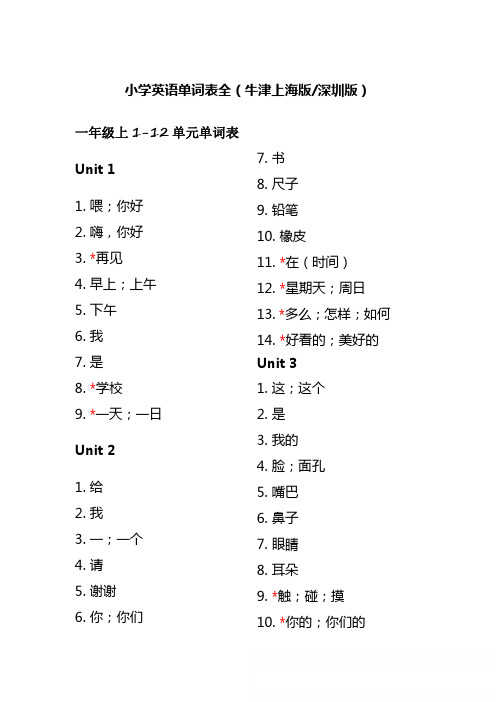
小学英语单词表全(牛津上海版/深圳版)Unit11.喂;你好2.嗨,你好3.*再见4.早上;上午5.下午6.我7.是8.*学校9.*一天;一日Unit2一年级上1-121.给2.我3.一;一个4.请5.谢谢6.你;你们单元单词表7.书8.尺子9.铅笔10.橡皮11.*在(时间)12.*星期天;周日13.*多么;怎样;如何14.*好看的;美好的Unit31.这;这个2.是3.我的4.脸;面孔5.嘴巴6.鼻子7.眼睛8.耳朵9.*触;碰;摸10.*你的;你们的11.*图画12.它13.*看14.*不;不是15.*不是Unit41.能;能够2.唱;歌唱3.跳舞4.读;朗读5.画画6.什么7.做Unit56.爷爷;外公;(外)祖父7.妈妈;母亲8.*1.谁2.她3.奶奶;外婆;(外)祖母4.他5.爸爸;父亲是;对Unit61.高的2.矮的3.胖的4.瘦的5.*同学6.*朋友Unit71.多少2.三3.二4.六5.一6.四7.五8.*让我们9.*数数Unit81.苹果2.梨3.桃子4.桔子5.*在(地点)6.*(表示特指)7.*超市Unit91.可以2.有;拥有3.果馅饼4.汉堡包5.比萨饼6.蛋糕7.*小吃;点心8.*小吃部Unit101.*(牛叫声)2.那;那个3.母牛;奶牛4.小鸡5.*(鸡叫声)6.鸭子7.猪8.*(猪叫声)9.*(鸭叫声)10.*剪下;切下11.*粘贴Unit111.猴子2.熊3.熊猫4.老虎Unit121.颜色;涂色2.*风筝3.在哪里4.在......里面5.*树;树木6.黄色的7.红色的8.蓝色的9.绿色的10.小的11.*发出(某种声音)12.大的Unit11.看见2.青蛙3.兔子4.蜜蜂5.鸟Unit23.绵羊(复数)4.母鸡5.狗6.猫7.*1.*听2.听见家Unit31.闻(......的气味)2.尝(......的味道)3.米饭4.汤一年级下1-12单元单词表5.蛋6.面条7.*美味的8.*餐馆9.*帮助10.*站起来11.*花Unit41.*玩具2.喜欢3.球4.玩具娃娃5.风筝6.自行车7.*玩具店8.*超级的,顶好的Unit51.*食物2.糖果;甜的3.果冻4.冰淇淋5.饼干6.*茶点时间7.*给......8.*和9.*对不起;抱歉10.*非常Unit63.可乐4.果汁5.牛奶6.*生日7.*聚会;派对8.*快乐的9.*1.*饮料2.水歌曲Unit71.*季节2.春天3.夏天4.秋天5.冬天6.白色的7.草8.西瓜Unit81.怎样;如何2.天气3.多云的4.阳光明媚的5.有雨的;多雨的6.有风的;多风的7.*炎热的8.*去9.*到;向10.*沙滩;海滩Unit91.*衣服2.需要3.新的4.T恤衫5.连衣裙6.短裤7.女士衬衫Unit104.踢(球);玩5.放(风筝)6.*游戏时间7.*足球8.*1.*活动2.骑(车)3.跳绳绳子Unit111.*新年2.礼物3.卡片4.鞭炮;爆竹5.烟火;烟花6.*制作7.*写8.*折9.*小姐8.*(do的否定形式)10.*购物Unit121.男孩2.狼3.狼(复数)4.农夫5.*旁白员;叙述者6.*来7.*哪里8.*坏的9.*可怜的10.*说;告诉11.*谎话;谎言12.*逃跑Unit11.高的2.矮的3.男孩4.女孩5.不;不是6.对7.*1.好的2.晚上;傍晚3.夜晚4.*一天;一日5.妈妈6.*今天7.*很好;非常好8.*蚂蚁9.*熊Unit2名字二年级上1-12Unit3单元单词表1.对不起;请原谅2.七3.八4.九5.十6.*大象Unit41.游泳2.跑3.书写;写字4.飞;飞翔5.*骑自行车6.*不能;不会7.*长颈鹿Unit51.家;家庭2.哥哥;弟弟3.姐姐;妹妹4.朋友5.年轻的6.老的7.*昆虫8.*水母Unit68.*狮子9.*1.头发2.头3.你的4.长的5.*现在6.看7.*袋鼠有Unit71.*(学校或公园中的)游戏场2.滑梯3.秋千4.跷跷板5.*夜莺Unit81.*房间2.放3.(表示特指)4.包5.爸爸6.盒子;箱子7.在......上8.椅子9.书桌10.*小汽车11.看12.*铅笔盒;铅笔袋13.*公牛14.劳动;干活15.*睡觉Unit91.*正餐;晚餐2.*准备好3.盘子;碟子4.筷子5.碗6.匙;调羹7.*蜂王;蜂后8.*飞来飞去9.*跑来跑去Unit104.太阳5.星6.*蛇7.*1.*天空2.月亮3.明亮的国王Unit111.森林2.狐狸3.肉类4.河马5.*野生的6.*动物7.*可爱的8.*(表示惊奇)哇,呀9.*这么;那么10.*鸽子11.*天鹅Unit121.*大街;街道2.不要(=do not)(do not的缩写形式)3.不要(=don't)4.采;摘5.花6.爬7.树8.切;割;剪9.公园10.*令人愉快的;友好的11.*美丽的12.哭;哭泣13.*牦牛14.*斑马二年级下1-126.和;与Unit21.摸;摸起来2.触摸;碰3.坚硬的4.软的;柔软的5.感到快乐的6.生日7.给8.猜测9.铅笔盒;铅笔袋10.打开11.(表示极大的惊奇)哇,呀Unit11.是;就是2.他们;她们;它们3.棕色的;褐色的4.白色的5.黑色的12.表;手表单元单词表Unit31.火车;列车2.(大)船3.小汽车;轿车4.公共汽车;巴士5.听6.在......旁边7.窗户8.在......外面9.不能10.不能Unit41.东西;物2.(do的ing形式)做3.(run的ing形式)跑步4.(skate的ing 形式)滑(滑板);滑冰5.(hop的ing 形式)单脚跳行9.(skip的ing 形式)跳绳10.(fly的ing形式)飞;飞翔11.(swim的ing形式)游泳12.也13.让我们(=let u s)14.让我们(=let's)骑;驾驶7.滑(滑板);溜冰8.单脚跳行15.在一起;共同Unit51.(表示愿意、喜欢)2.一些3.(生吃的)蔬菜色拉4.(表示同意)当然6.(ride的ing形式) 5.(=do not)(do的否定式)不,勿6.(=don't)(do 的否定式)不,勿7.鱼;鱼肉8.鸡;鸡肉9.令人愉快的10.美味的Unit61.斑马2.长颈鹿3.蛇4.大象5.狮子6.玩具店7.玩具Unit71.骑自行车2.放风筝3.堆雪人4.吃5.水果6.(sleep的ing 形式)睡觉Unit81.交通2.规则;规章3.灯;电灯4.停止;停下5.去;走6.等;等待Unit91.毛衣;线衣2.(尤指男式的)衬衫3.外套;大衣4.裤子5.寒冷的6.温暖的7.(狗叫声)汪汪Unit101.玩溜溜球2.打牌3.踢足球Unit111.读书日2.今天3.许多4.有趣的5.书签6.想法;主意7.系;绑8.关于9.机器人Unit12三上1-129.要;想要10.牛奶11.面包12.想做(某事)13.床1.熊爸爸2.熊妈妈3.熊宝宝4.外出5.感到饿的6.口渴的7.疲倦的;疲劳的8.房屋;房子14.小的单元单词表汇Unit11.艾丽丝2.乔3.凯蒂4.彼得5.你好6.我7.小姐8.你好。
小学英语一年级词汇表(可打印版)

小学英语词汇表(牛津上海版一年级)book [buk] 书ruler ['ru:lə] 尺pencil['pensl] 铅笔rubber [`rᴧbə] 橡皮pen [pen] 钢笔bag[bæg] 书包,包read [ri:d] 读write [rait] 写draw [drᴐ:] 画sing [siϦ] 唱dance [da:ns] 跳舞nose [nuz] 鼻子apple [`æpl] 苹果orange['ᴐrindӡ] 桔子,橙pear [per] 梨lemon [`lemn] 柠檬melon [`meln] 甜瓜peach [pi:t∫] 桃taro [ta:ru] 芋头moon [mu:n] 月亮bean [bi:n] 豆leaf [li:f] 树叶short [∫ᴐ:t] 短,矮doctor [dᴐktә] 医生nurse[nә:s] 护士cook [kuk] 煮,烹调old [uld] 老,旧young [jᴧϦ] 年轻farmer [`fa:mә] 农夫fisherman [fi∫әmәn] 渔夫fat [fæt] 胖park [pa:k] 公园road [rud] 道路hotdog [hᴐtdᴐg] 热狗juice [dӡu:s] 果汁water['wᴐ:tә] 水cat [kæt] 猫dog [dᴐg] 狗play [plei] 玩stop [stᴐp] 停light [`lait] 光go [gu] 走fast [fa:st] 快slow [slu] 慢jump [dӡᴧmp] 跳远face [feis] 脸eye [ai] 眼睛ear [eə] 耳朵mouth [mauθ] 嘴bee [bi:] 蜜蜂red [red] 红色blue [blu:] 蓝色milkman [milkmn] 送牛奶的人tall [tᴐ:l] 高building [`bildiϦ] 建筑bird [bərd] 小鸟pizza [`pi:tsə] 比萨饼biscuit [`biskit] 饼干jelly [`dӡeli] 果冻in [in] 在里面ice-cream [`aiskri:m] 冰淇淋on [ˈᴐn] 在上面under [`ᴧnd] 在下面bell [bel] 铃声star [sta:] 星present [preznt] 礼物tree [tri:] 树coat [cut] 外衣hen [hen] 母鸡chick [t∫ik] 小鸡duck [dᴧk] 鸭子cow [kau] 奶牛sheep [∫i:p] 绵羊pig [pig] 猪horse [hᴐ:s] 马bear [bεə] 熊elephant [`elifnt] 大象tiger [`taigə] 老虎monkey [`mᴧki] 猴子panda [`pændə] 熊猫dirty[`də:ti] 脏的wash [wᴐ∫] 洗towel [`taul] 毛巾soap [sup] 香皂toothbrush ['tu:θbrᴧ∫] 牙刷toothpaste ['tu:θpeist] 牙膏bowl [bul] 碗plate [pleit] 盘子glass [gla:s] 杯子fork [fᴐ:k] 叉子knife [naif] 刀spoon [spu:n] 匙勺chopsticks [`t∫ᴐpstik] 筷子 summer ['sᴧmə] 夏天 quilt [kwilt] 被子rubber ['rᴧbə] 橡皮sweet [swi:t] 糖果tree [tri:] 树autumn ['ᴐ:tm] 秋天father ['fɑ:ðə] 爸爸mother ['mᴧðə] 妈妈sister ['sistə] 姐妹bicycle [`baisikl] 自行车 doll [dul] 娃娃ball [bᴐ:l] 球slide [slaid] 滑梯swing [swi] 秋千balloon [b'lu:n] 气球uncle ['ᴧkl] 叔叔aunt [ɑ:nt] 阿姨grandmother ['ɡrænd,mᴧðə] 奶奶grandfather ['ɡrænd,fa:ðə] 爷爷frog [frᴐg] 青蛙rabbit [`ræbit] 兔子butterfly [`bᴧtəflai] 蝴蝶yellow [`jelu] 黄色green [gri:n] 绿色pink [pink] 粉色purple [pə:pl] 紫色brown [braun] 棕色orange [`ᴐrindӡ] 桔色postman [`pustmn] 邮递员policeman[pə`li:smn] 警察driver [draivə] 司机thin [θin] 瘦fireman [`faiəmn] 消防队员cake [keik] 蛋糕sweet [swi:t] 糖果 milk [milk] 牛奶coke [kuk] 可乐meat [mi:t] 肉fish [fi∫] 鱼chicken [`t∫ikin] 鸡肉rice [rais] 米饭noodles [nu:dlz] 面条vegetable [vedӡtəbl] 蔬菜run [rᴧn] 跑sleep [sli:p] 睡觉swim [swim] 游泳egg [eg] 鸡蛋fish [fi∫] 鱼plane [plein] 飞机ferry [`feri] 渡轮train [trein] 火车taxi[`tæksi] 出租车bus [bᴧs] 公交车van [væn] 厢式货车girl [gə:l] 女孩boy [bᴐi] 男孩hand [hænd] 手kite [kait] 风筝hat [hæt] 帽子gloves [glᴧvz] 手套scarfs [skɑ:fz] 围巾winter [`wintə] 冬天cold [kuld] 冷wind [wind] 风snow [snu] 雪light [`lait] 灯tie [tai] 领带belt [belt] 腰带dress[dӡres] 连衣裙socks [sᴐks] 袜shirt [∫ə:t] 衬衫window [`windu] 窗户door [dᴐ:] 门bed [bed] 床room [ru:m] 房间sofa [`sufə] 沙发table [`teibl] 桌子lamp [læmp] 灯walk [wᴐ:k] 散步skip [skip] 跳绳swing [swiϦ] 摇摆climb [klaim] 爬行fly [flai] 飞行ride [raid] 骑sun [sᴧn] 太阳cloud [klaud] 云hot [hᴐt] 热的beach [bi:t∫] 海滩shell [∫el]] 贝壳sand[sænd] 沙子watch [wᴐt∫] 手表clock [clᴐk] 时钟day [dei] 天night [nait] 晚上breakfast [`brekfəst] 早餐lunch [lᴧnt∫] 午餐dinner [`dinə] 晚餐soup [su:p] 汤bin [bin] 箱子umbrella [ᴧm`brelə] 雨伞xray[`eks,rei] X光please [pli:s] 请window ['windu] 窗户eleven [i'levn] 十一twelve [twelv] 十二birthday ['bə:θdei] 生日here's =here is [hiz] 这是she's =she is [i:z] 她是blackboard ['bælkbᴐ:d] 黑板desk [desk] 书桌 chair[t∫æə] 椅子cap [kæp] 帽子many ['meni] 许多how many 多少ten [ten] 十introduction [,intru'dᴧk∫n] 介绍knee [ni:] 膝盖hat [hæt] 帽子this [ðis] 这个school [sku:l] 学校pupil ['pju:pl] 小学生 that [ðæt] 那个pen [pen] 钢笔happy ['hæpi] 快乐的point to 指向old [uld] 年老的how old 多大no [nu] 不not [nᴐt] 不isn't =is not ['iznt] 不是help [help] 救命(呼救) family ['fmili] 家庭up [ᴧp] 向上Amy ['eimi] 埃米Bob ['bᴐb] 鲍勃grandpa ['grændpɑ:] 祖父,外祖父grandma ['grændmɑ:] 祖母,外祖母sister ['sistə] 姐妹brother ['brᴧðə] 兄弟shoulder ['∫uld] 肩膀sit [sit] 坐stand [stænd] 站body ['bᴐdi] 身体his [hiz] 他的head [hed] 头arm [ɑ:m] 胳膊leg [leg] 腿foot [fut] 脚(单数)her [hə:] 她的look at ['luk ət] 看着now [nau] 现在number ['nᴧmbə] 数字again [ə'gein] 再一次 chameleon [kə'mi:li:ən] 变色龙colour [kᴧlə] 颜色down [daun] 向下dragon['drægn] 龙finger ['fingə] 手指greeting ['gri:tiϦ] 问候know [nu] 知道little ['litl] 小的rainbow ['reinbu] 彩虹say [sei] 说Sam [sæm] 萨姆Smart[smɑ:t] 斯马特to [tu:] 向…toe [tu] 脚趾point [pᴐint] 指(朝…指)one [wᴧn] 一two [tu:] 二three [θri:] 三four [fᴐ:] 四five [fai] 五six [siks] 六seven [sevn] 七eight [eit] 八nine [nain] 九。
北京版一年级起点小学英语一年级上(英语单词表)

牛津上海版小学英语一年级上册(英语单词表,带发音)Module 1 Unit 1Module 1 Unit 2Module 1 Unit 3morning英音 [ˈm ɔːn ɪŋ]美音 [ˈm ɔːrn ɪŋ]n. 早晨;黎明;初期afternoon英音 [ˌɑːftəˈnu ːn]美音 [ˌæft ər ˈnu ːn]n. 午后,下午book英音 [b ʊk]美音 [b ʊk]n. 书籍;卷;帐簿;名册;工作簿 vt. 预订;登记ruler英音 [ˈru ːl ə(r)]美音 [ˈru ːl ər]n. 尺;统治者;[测] 划线板,划线的人pencil英音 [ˈpens(ə)l]美音 [ˈpensl]n. 铅笔;笔状物 vt. 用铅笔写;用眉笔涂 vi.成铅笔状rubber英音 [ˈrʌb ə(r)]美音 [ˈr ʌb ər]n. 橡胶;橡皮;合成橡胶;按摩师 adj. 橡胶制成的 vt. 涂橡胶于;用橡胶制造 vi. 扭转脖…eye英音 [a ɪ]美音 [a ɪ]n. 眼睛;视力;眼光;见解,观点 vt. 注视,看mouth英音 [ma ʊθ]美音 [ma ʊθ]n. 口,嘴;河口 vt. 做作地说,装腔作势地说;喃喃地说出 vi. 装腔作势说话face英音 [fe ɪs]美音 [fe ɪs]n. 脸;表面;面子;面容;外观;威信 vi.向;朝 vt. 面对;面向;承认;抹盖nose英音 [n əʊz]美音 [no ʊz]n. 鼻子;嗅觉;突出的部分;探问 vt. 嗅;用鼻子触 vi. 小心探索着前进;探问ear英音 [ɪə(r)]美音 [ɪr]n. 耳朵;穗;听觉;倾听 vi. (美俚)听见;抽穗Module 2 Unit 1Module 2 Unit 2Module 2 Unit 3dance英音 [dɑːns]美音 [dæns]n. 舞蹈;舞会;舞曲 adj. 舞蹈的;用于跳舞的 vt. 跳舞;使跳跃 vi. 跳舞;跳跃;飘扬read英音 [ri ːd]美音 [ri ːd]n. 阅读;读物 adj. 有学问的 vi. 读;读起来vt. 阅读;读懂,理解sing英音 [s ɪŋ]美音 [s ɪŋ]n. 演唱;鸣声;呼啸声 vt. 唱;用诗赞颂;唱着使 vi. 唱歌;歌颂;鸣叫;呼号draw英音 [dr ɔː]美音 [dr ɔː]n. 平局;抽签 vi. 拉;拖 vt. 画;拉;吸引grandfather英音 [ˈɡrænfɑːðə(r)]美音 [ˈɡrænfɑːðər]n. 祖父;始祖 vt. 不受新规定限制grandmother英音 [ˈɡrænm ʌðə(r)]美音 [ˈɡrænm ʌðər]n. 祖母;女祖先 vt. 当…的祖母 vi. 当祖母father英音 [ˈfɑːðə(r)]美音 [ˈfɑːðər]n. 父亲,爸爸;神父;祖先;前辈 vt. 发明,创立;当…的父亲mother英音 [ˈm ʌðə(r)]美音 [ˈm ʌðər]n. 母亲;大娘;女修道院院长 vt. 生下;养育;像母亲般关怀或照管 adj. 母亲的;出生…me英音 [mi; mi ː]美音 [mi; mi ː]pron. 我(宾格) n. 自我;极端自私的人;自我的一部分fat英音 [fæt]美音 [fæt]n. 脂肪,肥肉 adj. 肥的,胖的;油腻的;丰满的 vt. 养肥;在…中加入脂肪 vi. 长肥thin英音 [θɪn]美音 [θɪn]n. 细小部分 adj. 薄的;瘦的;稀薄的;微弱的 vt. 使瘦;使淡;使稀疏 vi. 变薄;变瘦;…tall英音 [t ɔːl]美音 [t ɔːl]adj. 高的;长的;过分的;夸大的 adv. 夸大地short英音 [ʃɔːt]美音 [ʃɔːrt]n. 短;缺乏;短路;短裤 adj. 短的;不足的;矮的,低的 adv. 不足;突然;唐突地Module 3 Unit 1Module 3 Unit 2Module 3 Unit 3的;矮的,低的不足;突然;唐突地one英音 [w ʌn]美音 [w ʌn]pron. 一个人;任何人 adj. 一的;唯一的 n.一 num. 一;一个two 英音 [tu ː]美音 [tu ː]num. 二 n. 两个 adj. 两个的three 英音 [θri ː]美音 [θri ː]num. 三 n. 三,三个 adj. 三的,三个的four 英音 [f ɔː(r)]美音 [f ɔːr]num. 四;四个 adj. 四的;四个的five英音 [fa ɪv]美音 [fa ɪv]num. 五,五个 n. 五,五个;五美元钞票 adj.五的;五个的six英音 [s ɪks]美音 [s ɪks]num. 六,六个 n. 六,六个apple英音 [ˈæp(ə)l]美音 [ˈæpl]n. 苹果,苹果树,苹果似的东西;[美俚]炸弹,手榴弹,(棒球的)球;[美俚]人,家…pear英音 [pe ə(r)]美音 [per]n. [园艺] 梨树;梨子peach英音 [pi ːt ʃ]美音 [pi ːt ʃ]n. 桃子;桃树;桃红色;受人喜欢的人(或物) adj. 桃色的;用桃子制成的 vt. 告发 vi.…orange英音 [ˈɒr ɪnd ʒ]美音 [ˈɔr ɪnd ʒ]adj. 橙色的;橘色的 n. 橙;橙色;桔子hamburger英音 [ˈhæmb ɜːɡə(r)]美音 [ˈhæmb ɜːrɡər]n. 汉堡包,火腿汉堡;牛肉饼,肉饼;碎牛肉pizza英音 [ˈpi ːts ə]美音 [ˈpi ːts ə]n. 比萨饼(一种涂有乳酪核番茄酱的意大利式有馅烘饼)cake英音 [ke ɪk]美音 [ke ɪk]n. 蛋糕;块状物;利益总额 vt. 使结块 vi. 结成块状Module 4 Unit 1Module 4 Unit 2Module 4 Unit 3pie 英音 [pa ɪ]美音 [pa ɪ]n. 馅饼;饼图;爱说话的人 vt. 使杂乱chick 英音 [t ʃɪk]美音 [t ʃɪk]n. 小鸡;小鸟;少妇 adj. 胆小的;懦弱的duck英音 [d ʌk]美音 [d ʌk]n. 鸭子;鸭肉;(英)宝贝儿;零分 vt. 躲避;猛按…入水 vi. 闪避;没入水中cow 英音 [ka ʊ]美音 [ka ʊ]n. 奶牛,母牛;母兽 vt. 威胁,恐吓pig英音 [p ɪɡ]美音 [p ɪɡ]n. 猪;猪肉 vi. 生小猪;像猪一样过活 n. 警察(俚语,带有攻击性)bear英音 [be ə(r)]美音 [ber]n. 熊 vt. 结果实,开花(正式) vt. 忍受;承受;具有;支撑tiger英音 [ˈta ɪɡə(r)]美音 [ˈta ɪɡər]n. 老虎;凶暴的人monkey英音 [ˈm ʌŋki]美音 [ˈm ʌŋki]n. 猴子;顽童 vi. 胡闹;捣蛋 vt. 嘲弄panda英音 [ˈpænd ə]美音 [ˈpænd ə]n. 熊猫;猫熊red英音 [red]美音 [red]n. 红色,红颜料;赤字 adj. 红色的;红肿的,充血的blue英音 [blu ː]美音 [blu ː]adj. 蓝色的;沮丧的,忧郁的;下流的 n. 蓝色;[复数](美国海、陆、空三军穿的)蓝…yellow英音 [ˈjel əʊ]美音 [ˈjelo ʊ]n. 黄色;黄种人;黄色颜料 adj. 黄色的;黄皮肤的 vt. 使变黄或发黄 vi. 变黄或发黄green英音 [ɡri ːn]美音 [ɡri ːn]n. 绿色;青春 adj. 绿色的;青春的 vt. 使…变绿色 vi. 变绿色。
小学一年级英语单词带音标
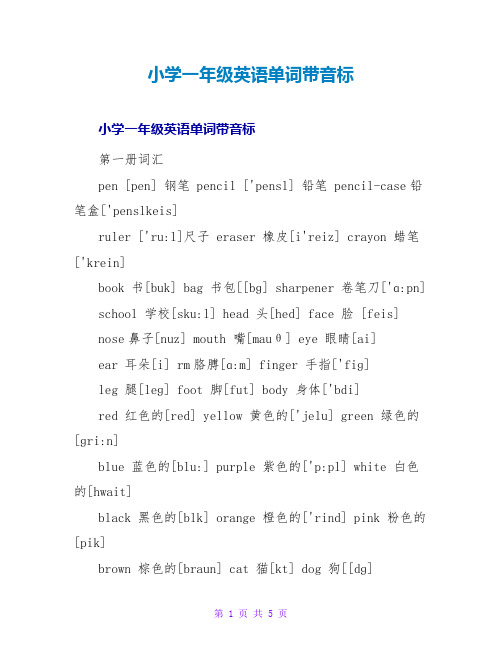
小学一年级英语单词带音标小学一年级英语单词带音标第一册词汇pen [pen] 钢笔 pencil ['pensl] 铅笔 pencil-case铅笔盒['penslkeis]ruler ['ru:l]尺子 eraser 橡皮[i'reiz] crayon 蜡笔['krein]book 书[buk] bag 书包[[bɡ] sharpener 卷笔刀['ɑ:pn] school 学校[sku:l] head 头[hed] face 脸 [feis]nose鼻子[nuz] mouth 嘴[mauθ] eye 眼睛[ai]ear 耳朵[i] rm胳膊[ɑ:m] finger 手指['fiɡ]leg 腿[leɡ] foot 脚[fut] body 身体['bdi]red 红色的[red] yellow 黄色的['jelu] green 绿色的[ɡri:n]blue 蓝色的[blu:] purple 紫色的['p:pl] white 白色的[hwait]black 黑色的[blk] orange 橙色的['rind] pink 粉色的[pik]brown 棕色的[braun] cat 猫[kt] dog 狗[[dɡ]monkey 猴子['mki] panda 熊猫['pnd] rabbit 兔子['rbit]duck 鸭子[dk] pig 猪[piɡ] bird 鸟[b:d]bear 熊[bε] elephant 大象['elifnt] mouse 老鼠[maus]squirrel 松鼠['skw:rl] cake 蛋糕[keik] bread 面包[bred]hot dog 热狗 hamburger汉堡包['hmb:ɡ] chicken 鸡肉['tikin]French fries 榨薯条 Coke 可乐[kuk] juice 果汁[du:s] milk 牛奶[milk] water 水['w:t] tea 茶[ti:]coffee 咖啡['kfi] one一[wn] two 二[tu:]three 三[θri:] four 四[f:] five 五[faiv]six 六[siks] seven 七['sevn] eight 八[eit]nine 九[nain] ten 十[ten] doll 玩具娃娃[dl]boat 小船[but] ball 球[b:l] kite 风筝[kait]balloon 气球[b'lu:n] car 小汽车[kɑ:] plane 飞机[plein]第二册词汇I am (我)是[m] you 你[ju: ] are (你)是[ɑ: ]e in. 进来[km] name 名字[neim] class 班[klɑ:s ]good 好的[ɡud] good morning! 早上好! new新的[nju: ]from 从[frm] from beijing 从北京来的 we 我们[wi: ] chair 椅子[tε] wall 墙[w:l] ball 球[b:l]box 盒子[bks] floor 地板[fl:]at 在[t] zoo 动物园[zu:] at the zoo 在动物园里park 公园[pɑ:k] classroom 教室['klɑ:srum] factory工厂['fktri]square 广场[skwε] capital首都['kpitl] China 中国['tain]the capital of China 中国的首都 love 爱[lv]motherland 祖国['mlnd] has有[hz] star 星[stɑ:]our我们的['au] national国家的['nnl] cap 帽子[kp]national flag国旗[flɡ] coat上衣[kut] have有[hv]long长的[l:] short短的,矮的.[:t] big大的[biɡ]small小的[sm:l] or或, 还是[: ] guess 猜[ɡes]hey 嗨[hei] tall高的[t:l] old年老的[uld]young年轻的[j] Chinese 中国的;汉语;中国人['tai'ni:z]English英国的;英语;英国人['igli] over 越(过) ['uv]there 那儿[ε] over there 在那边 American美国的,美国人['merikn]other另外的['] an一(个) [n] apple苹果['pl]orange桔子['rind] hand手[hnd] egg蛋[eɡ]umbrella 伞[m'brel] school is over. 放学了 home家[hum]go home 回家 rain 雨;下雨[rein] it's raining. 正在下雨can't 不能 now 如今[nau] much许多[mt]how much 多少 eleven 十一[i'levn] twelve十二[twelv]minus 减['mains] here这儿[hi] here you are. 给你money 钱['mni] they 他(她,它)们 twenty 二十['twenti]these 这些[i:z] those 那些[uz] door 门[d:]window窗['windu] picture图画['pikt] talk说话,议论[t:k]about 关于['baut] flower花['flau] some 一些[sm] boat 船[but] lake 湖[leik] skirt 裙子[sk:t]clean 清洁的[kli:n] shirt (男式)衬衫[:t] dirty脏的['d:ti]cup 杯子[kp] glass玻璃杯[ɡlɑ:s] picture-book 图画书have a look 看一看 sure 当然,一定[u] and和[nd]grade 年级[ɡreid] maths数学[mθs] your 你们的[j: ] their 他(她,它)们的[ε] pioneer 先锋[,pai'ni]young pioneer 少年先锋队员 scarf 领巾[skɑ:f] red scarf 红领巾both 两[buθ] all全部,都[:l] peasant农民['peznt] soldier士兵['suld] doctor医生[dkt] class is over下课了play 玩[plei] there are 有 do做du: ]what are they doing? 她们在做什么?pingpong 乒乓right对的[rait]join 参加[din] them 他(她,它)们(宾格) [em]。
不要抛弃学问(胡适)翻译

不要抛弃学问 1 (胡适)诸位毕业生同学2:你们现在要离开母校了,我没有什么礼物送给你们,只好送你们一句话罢。
这一句话是:“不要抛弃学问。
”以前的功课也许有一大部分是为了这张文凭,不得已而做的。
从今以后,你们可依自己的心愿自由研究了。
趁现在年富力强3的时候,努力做一种专门学问。
少年4是一去不复返的,等到精力衰时,要做学问5也来不及了。
即为吃饭计,学问决不会辜负人的6。
吃饭而不求学问,三年五年之后,你们都要被后来的少年淘汰掉的。
到那时再想做点学问来补救,恐怕也太晚了。
有人说:“出去做事之后,生活问题急需解决,哪有功夫去读书?即使要做学问,既没有图书馆,又没有实验室,哪能做学问?”我要对你们说:凡是要等到有了图书馆方才读书的,有了图书馆也不肯读书。
凡是要等到有了实验室方才做研究的,有了实验室也不肯做研究7。
你有了决心要研究一个问题,自然会撙衣节食8去买书,自然会想出法子来设置仪器。
至于时间,更不成问题9。
达尔文一生多病,不能多作工,每天只能做一点钟的工作。
你们看他的成绩!每天花一点钟看10页有用的书,每年可看3600多页书;30年可以读11万页书。
诸位,11万页书可以使你成为一个学者了。
可是,每天看三种小报纸也得费你一点钟的功夫;四圈麻将10也得费你一点半钟的光阴。
看小报呢?还是打麻将呢?还是努力做一个学者呢?全靠你们自己的选择11!易卜生12说:“你的最大责任是把你这块材料铸造成器。
”学问便是铸器的工具。
抛弃了学问便是毁了你们自己。
再会了!你们的母校眼睁睁地13要看你们十年之后成什么器14。
Notes:1.《不要抛弃学问》是胡适先生在1928~1930年在上海任中国公学校长时为毕业生所作的赠言。
胡适(1981~1962)是新文化运动中很有影响的人物。
1946年曾任北京大学校长。
除学术著作外,他写过不少富有洞察力和启发性的小品文,本文就是其中一例。
“不用抛弃学问”若直译成:Never Give up Learning,意思不明确,统观全文可以了解到这句话的意思是“不用放弃对学问的追求”,必须加字:Never Give up the Pursuit of Learning 更为准确。
人教版英语一年级上册词汇拼读

人教版英语一年级上册词汇拼读
人教版英语一年级上册的词汇拼读主要包括一些基础的单词和短语,以下是一些常见的词汇和拼读:
1. apple /ˈæpl/ 苹果。
2. book /bʊk/ 书。
3. cat /kæt/ 猫。
4. dog /dɔːg/ 狗。
5. egg /ɛɡ/ 鸡蛋。
6. fish /fɪʃ/ 鱼。
7. girl /ɡɜːrl/ 女孩。
8. hat /hæt/ 帽子。
9. ice cream /aɪs krim/ 冰淇淋。
10. juice /dʒuːs/ 果汁。
这些词汇都是一年级学生学习英语时会接触到的基础词汇,通过这些词汇的拼读和学习,学生可以逐步建立起英语基础。
在教学中,老师通常会结合图片、动作等多种方式帮助学生记忆和掌握这些词汇,同时也会进行听、说、读、写的综合训练,以便让学生能够全面掌握这些词汇的拼读和运用。
除了基础单词外,一年级上册还会涉及一些日常用语和简单的问候语,这些内容也是学生学习的重点之一。
总的来说,一年级上册的英语词汇拼读主要以基础单词和日常用语为主,通过系统的教学和练习,学生可以逐步建立起对英语基础知识的掌握,为日后的学习打下坚实的基础。
一年级英语单词表

Unit 1 Word List 单词表book 书ruler 尺子pencil 铅笔eraser 橡皮pencil case 铅笔盒backpack 书包school 学校Unit 2 Word List 单词表eye 眼睛hand 手ear 耳朵mouth 嘴nose 鼻子foot(feet)脚face 脸leg 腿arm 手臂Unit 3 Word List 单词表cat 猫bird 鸟rabbit 兔dog 狗chicken 鸡duck 鸭monkey 猴子tiger 虎panda 熊猫elephant 大象fish 鱼Unit 4 Word List 单词表one 一two 二three 三four 四five 五six 六seven 七eight 八nine 九ten 十Unit 5 Word List 单词表red 红色(的)yellow 黄色(的)purple 紫色(的)brown 棕色(的)orange 橙色(的)white 白色(的)green 绿色(的)pink 粉红色(的)blue 蓝色(的)black 黑色(的)Unit 6 Word List 单词表apple 苹果banana 香蕉peach 桃melon 瓜pear 梨orange 橙子grape 葡萄strawberry 草莓pineapple 菠萝Unit9 classroomclassroom 教室door 门window 窗blackboard 黑板wall 墙desk 课桌chair 椅子boy 男孩girl 女孩in 在...里面on 在...上面under 在...下面behind 在...后面next to 下一个where 哪里unit 10 My roomroom 房间closet 关门telephone 电话computer 电脑TV 电视bed 床picture 图片table 桌子lamp 台灯armchair 沙发Unit 11 Toystoys 玩具plane 飞机boat 小船train 火车ball 球teddy bear 泰迪熊bus 公交车car 汽车doll 玩偶pinwheel 纸风车box 箱子Unit 13 ShapesShapes 形状circle 圆形triangle 三角形rectangle 长方形square 正方形eleven 十一twelve 十二Thirteen 十三fourteen 十四fifteen 十五sixteen 十六seventeen 十七eighteen 十八nineteen 十九twenty 二十Unit 14 Clothesclothes 衣服T-shirt T恤pants 长裤shorts 短裤jacket 夹克sweater 毛衣skirt 短裙dress 连衣裙shoe 鞋sock 袜子Unit 15 Food and drinkfood 食物drink 饮料rice 米noodles 面条jiaozi 饺子tofu 豆腐vegetables 蔬菜meat 肉fish 鱼chicken 鸡肉bread 面包milk 牛奶ice-cream 冰激凌juice 果汁egg 鸡蛋salad 色拉hamburger 汉堡包cake 蛋糕lassroom 教室door 门window 窗blackboard 黑板wall 墙desk 课桌chair 椅子boy 男孩girl 女孩in 在...里面on 在...上面under 在...下面behind 在...后面next to 下一个where 哪里room 房间closet 关门telephone 电话computer 电脑TV 电视bed 床picture 图片table 桌子lamp 台灯armchair 沙发toys 玩具plane 飞机boat 小船train 火车ball 球teddy bear 泰迪熊bus 公交车car 汽车doll 玩偶pinwheel 纸风车box 箱子Shapes 形状circle 圆形triangle 三角形rectangle 长方形square 正方形eleven 十一twelve 十二Thirteen 十三fourteen 十四fifteen 十五sixteen 十六seventeen 十七eighteen 十八nineteen 十九twenty 二十clothes 衣服T-shirt T恤pants 长裤shorts 短裤jacket 夹克sweater 毛衣skirt 短裙dress 连衣裙shoe 鞋sock 袜子food 食物drink 饮料rice 米noodles 面条jiaozi 饺子tofu 豆腐vegetables 蔬菜meat 肉fish 鱼chicken 鸡肉bread 面包milk 牛奶。
娜拉走后怎样800字英语作文
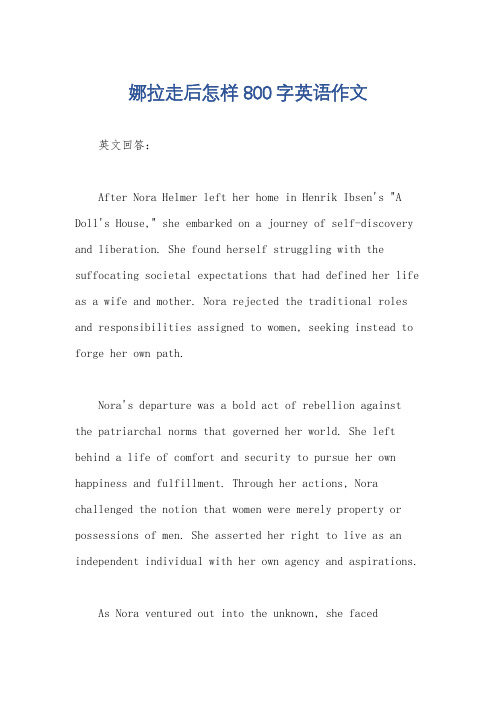
娜拉走后怎样800字英语作文英文回答:After Nora Helmer left her home in Henrik Ibsen's "A Doll's House," she embarked on a journey of self-discovery and liberation. She found herself struggling with the suffocating societal expectations that had defined her life as a wife and mother. Nora rejected the traditional roles and responsibilities assigned to women, seeking instead to forge her own path.Nora's departure was a bold act of rebellion against the patriarchal norms that governed her world. She left behind a life of comfort and security to pursue her own happiness and fulfillment. Through her actions, Nora challenged the notion that women were merely property or possessions of men. She asserted her right to live as an independent individual with her own agency and aspirations.As Nora ventured out into the unknown, she facednumerous challenges. She struggled with societal disapproval and judgment, as well as financial instability and loneliness. However, she persevered, drawing strength from her newfound sense of purpose. Nora's journey served as an inspiration to others, demonstrating the transformative power of self-reliance and the importance of breaking free from societal constraints.In the end, Nora's decision to leave her home was a catalyst for both personal and societal change. She blazed a trail for future generations of women, emboldening them to question traditional roles and to pursue their own dreams. Nora's legacy continues to resonate today, reminding us of the importance of self-determination and the courage to challenge the status quo.中文回答:娜拉在从亨利克·易卜生的《玩偶之家》中离开家后,踏上了自我探索和解放的旅程。
英语美文朗诵短文带翻译短篇朗读欣赏
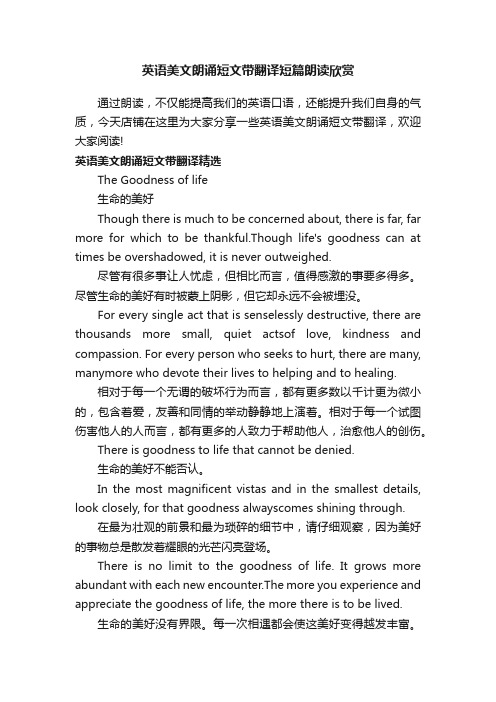
英语美文朗诵短文带翻译短篇朗读欣赏通过朗读,不仅能提高我们的英语口语,还能提升我们自身的气质,今天店铺在这里为大家分享一些英语美文朗诵短文带翻译,欢迎大家阅读!英语美文朗诵短文带翻译精选The Goodness of life生命的美好Though there is much to be concerned about, there is far, far more for which to be thankful.Though life's goodness can at times be overshadowed, it is never outweighed.尽管有很多事让人忧虑,但相比而言,值得感激的事要多得多。
尽管生命的美好有时被蒙上阴影,但它却永远不会被埋没。
For every single act that is senselessly destructive, there are thousands more small, quiet actsof love, kindness and compassion. For every person who seeks to hurt, there are many, manymore who devote their lives to helping and to healing.相对于每一个无谓的破坏行为而言,都有更多数以千计更为微小的,包含着爱,友善和同情的举动静静地上演着。
相对于每一个试图伤害他人的人而言,都有更多的人致力于帮助他人,治愈他人的创伤。
There is goodness to life that cannot be denied.生命的美好不能否认。
In the most magnificent vistas and in the smallest details, look closely, for that goodness alwayscomes shining through.在最为壮观的前景和最为琐碎的细节中,请仔细观察,因为美好的事物总是散发着耀眼的光芒闪亮登场。
一年级英语单词带音标大全

第⼀册词汇 pen [pen] 钢笔 pencil ['pensəl] 铅笔 pencil-case铅笔盒['pensəlkeis] ruler ['ru:lə]尺⼦ eraser 橡⽪[i'reizə] crayon 蜡笔['kreiən] book 书[buk] bag 书包[[bæɡ] sharpener 卷笔⼑['ʃɑ:pənə] school 学校[sku:l] head 头[hed] face 脸 [feis] nose⿐⼦[nəuz] mouth 嘴[mauθ] eye 眼睛[ai] ear ⽿朵[iə] rm胳膊[ɑ:m] finger ⼿指['fiŋɡə] leg 腿[leɡ] foot 脚[fut] body ⾝体['bɔdi] red 红⾊的[red] yellow 黄⾊的['jeləu] green 绿⾊的[ɡri:n] blue 蓝⾊的[blu:] purple 紫⾊的['pə:pl] white ⽩⾊的[hwait] black ⿊⾊的[blæk] orange 橙⾊的['ɔrindʒ] pink 粉⾊的[piŋk] brown 棕⾊的[braun] cat 猫[kæt] dog 狗[[dɔɡ] monkey 猴⼦['mʌŋki] panda 熊猫['pændə] rabbit 兔⼦['ræbit] duck 鸭⼦[dʌk] pig 猪[piɡ] bird 鸟[bə:d] bear 熊[bεə] elephant ⼤象['elifənt] mouse ⽼⿏[maus] squirrel 松⿏['skwə:rəl] cake 蛋糕[keik] bread ⾯包[bred] hot dog 热狗 hamburger汉堡包['hæmbə:ɡə] chicken 鸡⾁['tʃikin] French fries 榨薯条 Coke 可乐[kəuk] juice 果汁[dʒu:s] milk ⽜奶[milk] water ⽔['wɔ:tə] tea 茶[ti:] coffee 咖啡['kɔfi] one⼀[wʌn] two ⼆[tu:] three 三[θri:] four 四[fɔ:] five 五[faiv] six 六[siks] seven 七['sevən] eight ⼋[eit] nine 九[nain] ten ⼗[ten] doll 玩具娃娃[dɔl] boat ⼩船[bəut] ball 球[bɔ:l] kite 风筝[kait] balloon ⽓球[bə'lu:n] car ⼩汽车[kɑ:] plane 飞机[plein]。
关于比赛的英语谚语
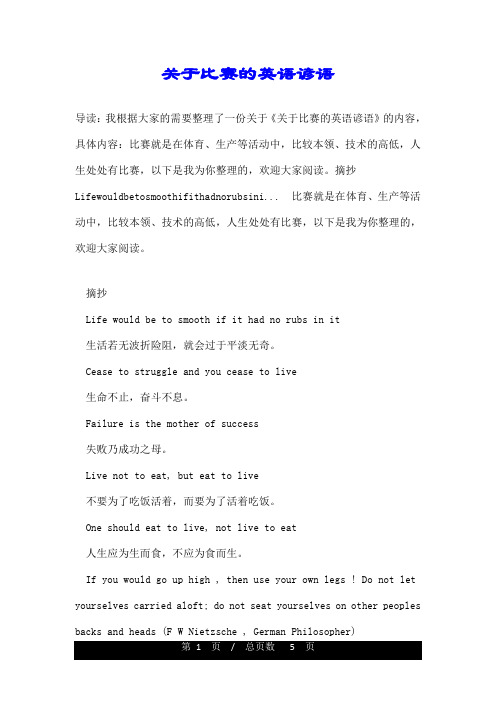
关于比赛的英语谚语导读:我根据大家的需要整理了一份关于《关于比赛的英语谚语》的内容,具体内容:比赛就是在体育、生产等活动中,比较本领、技术的高低,人生处处有比赛,以下是我为你整理的,欢迎大家阅读。
摘抄Lifewouldbetosmoothifithadnorubsini... 比赛就是在体育、生产等活动中,比较本领、技术的高低,人生处处有比赛,以下是我为你整理的,欢迎大家阅读。
摘抄Life would be to smooth if it had no rubs in it生活若无波折险阻,就会过于平淡无奇。
Cease to struggle and you cease to live生命不止,奋斗不息。
Failure is the mother of success失败乃成功之母。
Live not to eat, but eat to live不要为了吃饭活着,而要为了活着吃饭。
One should eat to live, not live to eat人生应为生而食,不应为食而生。
If you would go up high , then use your own legs ! Do not let yourselves carried aloft; do not seat yourselves on other peoples backs and heads (F W Nietzsche , German Philosopher)如果你想走到高处,就要使用自己的两条腿!不要让别人把你抬到高处;不要坐在别人的背上和头上。
(德国哲学家尼采。
F W)A strong man will struggle with storms of fate强者能与命运的风暴抗争。
精选It is not enough to be industrious, so are the ants What are you industrious about?( HD Thoreau)光勤劳是不够的,蚂蚁也是勤劳的。
关于比赛的英语谚语
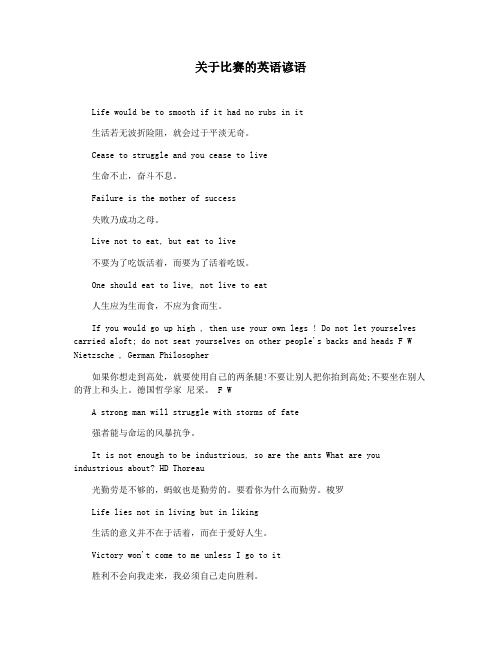
关于比赛的英语谚语Life would be to smooth if it had no rubs in it生活若无波折险阻,就会过于平淡无奇。
Cease to struggle and you cease to live生命不止,奋斗不息。
Failure is the mother of success失败乃成功之母。
Live not to eat, but eat to live不要为了吃饭活着,而要为了活着吃饭。
One should eat to live, not live to eat人生应为生而食,不应为食而生。
If you would go up high , then use your own legs ! Do not let yourselves carried aloft; do not seat yourselves on other people's backs and heads F W Nietzsche , German Philosopher如果你想走到高处,就要使用自己的两条腿!不要让别人把你抬到高处;不要坐在别人的背上和头上。
德国哲学家尼采。
F WA strong man will struggle with storms of fate强者能与命运的风暴抗争。
It is not enough to be industrious, so are the ants What are you industrious about? HD Thoreau光勤劳是不够的,蚂蚁也是勤劳的。
要看你为什么而勤劳。
梭罗Life lies not in living but in liking生活的意义并不在于活着,而在于爱好人生。
Victory won't come to me unless I go to it胜利不会向我走来,我必须自己走向胜利。
Fame usually comes to those who are thinking something else O W Holmes通常是没想到成名的人反而成了名。
- 1、下载文档前请自行甄别文档内容的完整性,平台不提供额外的编辑、内容补充、找答案等附加服务。
- 2、"仅部分预览"的文档,不可在线预览部分如存在完整性等问题,可反馈申请退款(可完整预览的文档不适用该条件!)。
- 3、如文档侵犯您的权益,请联系客服反馈,我们会尽快为您处理(人工客服工作时间:9:00-18:30)。
The family was through into poverty (were poor)
when Ibsen was 8 because of problems with his father's business. Nearly all traces of their previous affluence had to be sold off to cover debts, and the family moved to a rundown farm near town. There Ibsen spent much of his time reading, painting and performing magic tricks.
His next work,
1881's Ghosts stirred up even more controversy by tackling such topics as incest and venereal disease. The outcry was so strong that the play wasn't performed widely until two years later. His next work, An Enemy of the People, showed one man in conflict with his community. Some critics say it was Ibsen's response to the backlash he received for Ghosts. A few years later, Ibsen moved back to Germany where he wrote one of his most famous works. With Hedda Gabler (1890),
Henrik Ibsen
Introduction:
Henrik Ibsen was born on March 20, 1828, in Skien, Norway. He grew up as the oldest of five siblings. His parents were the merchant Knud Ibsen and Marichen Ibsen (maiden name Altenburg). In 1862, he was exiled to Italy, where he wrote the tragedy Brand. In 1868, Ibsen moved to Germany, where he wrote one of his most famous works: the play A Doll's House. In 1890, he wrote Hedda Gabler, creating one of theater's most notorious (famous) characters .By 1891, Ibsen had returned to Norway a literary hero. He died on May 23, 1906, in Oslo, Norway.
His later works seem to have a more selfreflective quality with mature lead characters looking back and living with the consequences of their earlier life choices. And each drama seems to end on a dark note. The first play written after his return to Norway was The Master Builder. The title character encounters a woman from his past who encourages him to make good on a promise. In When We Dead Awaken, written in 1899, an old sculptor runs into one of his former models and tries to recapture his lost creative spark. It proved to be his final play.
As a child, Henrik Ibsen showed little sign of the
theatrical genius he would become. He grew up in the small Norwegian coastal town of Skien as the oldest of five children born to Knud and Marichen Ibsen. His father was a successful merchant and his mother painted, played the piano and loved to go to the theater. Ibsen himself expressed an interest in becoming an artist as well.
Ibsen left Norway in 1862, eventually settling in
In 1868, Ibsen moved to Germany. During his
Italy for a time. There he wrote Brand, a five-act tragedy. The play made him famous in Scandinavia. Two years later, Ibsen created one of his masterworks, Peer Gynt. A modern take on Greek epics of the past, the verse play follows the title character on a quest.
time there, he saw his social drama The Pillars of Society first performed in Munich. The play helped launch his career and was soon followed up by one of his most famous works, A Doll's House. This 1879 play set tongues a-wagging throughout Europe for exploration of Nora's struggle with the traditional roles of wife and mother and her own need for self-exploration. Once again,
At 15, Ibsen stopped school and went to work. He
landed a position as an apprentice in an apothecary in Grimstad. Ibsen worked there for six years, using his limited free time to write poetry and paint. In 1849, he wrote his first play Catilina, a drama written in verse modeled after one of his great influences, William Shakespeare.
EARLY WORKS
Ibsen moved to Christiania (later known as Oslo) in 1850 to prepare for university examinations to study at the University of Christiania. Living in the capital, he made friends with other writers and artistic types. One of these friends, Ole Schulerud, paid for the publication of Ibsen's first play Catilina, which failed to get much notice. The following year, Ibsen had a fateful encounter with violinist and theater manager Ole Bull. Bull liked Ibsen and offered him a job as a writer and manager for the Norwegian Theatre in Bergen. The position proved to be an intense tutorial in all things theatrical and even included traveling abroad to learn more about his craft. In 1857, Ibsen returned to Christiania to run another theater there. This proved to be a frustrating venture for him, with others claiming that he mismanaged the theater and calling for his ouster. Despite his difficulties, Ibsen found time to write Love's Comedy, a satirical look at marriage, in 1862.
